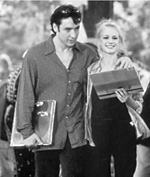In the first five minutes of the barely seen 1998 film Clay Pigeons, a beat-up farm truck rolls across a dried field, axles weeping and ill-fitted windows rattling. Inside the cab, a symphony of Budweiser empties is muted by the rhythmic stomp of a song on the radio. The steel-jawed driver (played by Joaquin Phoenix) is hunched over a greasy steering wheel, destination unknown. He has just accidentally shot and killed his best friend after having an affair with his wife. Over a shot of the cobalt sky above the speeding truck, a soft yelp of a voice croons: “I got it badly for a stick-legged girl/She’s gonna kill me/And I don’t mean softly.” Death, confusion, adultery, drunk driving—this is the house that country music built. Too bad it rarely translates well to celluloid; after the song ends, the movie slips into forgettable comedy-thriller terrain.
Old 97’s
Crocodile, Fri-Sat, May 28-29
The memorable voice on Phoenix’s fictional radio belongs to Rhett Miller of the Old 97’s. Careening and excitable, “Timebomb” (from the group’s major-label debut, Too Far to Care) brought the 97’s into star territory. Miller eventually befriended the movie’s cast, including pin-up boy Vince Vaughn and self-deprecating comic Janeane Garofalo. When he saw an early cut of the movie, though, Miller was horrified. A short time later he ran into Garofalo, who asked him if he’d seen Pigeons. “I told her I saw it, and it just came out that I liked it. I didn’t know what else to tell her,” says Miller. “She replied that she thought it really, really sucked. I breathed a sigh of relief, and said, ‘Oh, me too.'”
Though the Dallas-based Old 97’s have spent the majority of their six-year career dwelling in the hipster hemisphere of alt.country, where no one shoots anybody—they just write songs about it and then record them for Bloodshot—the band homes in on the fine line between punk and twang, often bounding over both into cold-sweat pop. On their latest, Fight Songs (Elektra), Miller relishes life’s quietly unsettling moments with the eye of a cinematographer and the soul of a short-story writer. The album’s saw-toothed melodies camouflage the bite of its lyrics; if Paul Westerberg can’t remember when the party started, Miller doesn’t care—he just wants to know why it had to end.
There are no fights here, only tension’s maddening embrace: A mother catches her 29-year-old daughter having sex (“Indefinitely”); a man reflecting on his past regrets dumping his first girlfriend (“Nineteen”); a vague hollow feeling gives a drunk boy suicidal thoughts, though he tells his lover he’s happy (“Lonely Holiday”). The gnawing thought that human experience should count for something—but often doesn’t—is what Miller chokes on.
“That’s one of the main reasons I left Sarah Lawrence,” Miller says, of his one year as a creative-writing major. “My professor always thought there had to be some sort of epiphany, a climactic moment, in a story. For me, the most dramatic times are the little things. I’m sitting in a bar, and I like to think about what I could do. I see a girl, I could ask her out. We could go home together, we could have sex, we could fall in love. We don’t. I don’t talk to her. But it’s the potential that’s exciting.”
This kind of passive fantasizing recalls the short stories of the late Raymond Carver, who specialized in championing the uneducated masses, the chronic drinkers with callused hands too tired to take off their work uniforms before passing out long after closing time. Like Carver, Miller makes his audience look a little closer at their neighbors. Listening to “Oppenheimer,” the tale of two new lovers sharing an apartment, one sees beneath the blue-collar exterior to something both sinister and beautifully resilient.
It’s strange, then, that last year Miller decided to join his girlfriend (who works in the movie industry) in the plastic-faced sprawl of LA. Old 97’s songs are all about being resigned to the aging process; LA players fight it with every last dollar spent on Tae-Bo and boob jobs. What gives?
“I stay home a lot,” Miller confesses. “It’s actually really fun to people-watch here. What I was sick of was being in Dallas and being me. I mean, if I wanted to go outside with no shirt on in my Rollerblades and play street hockey, I would get laughed at. Here nobody cares—they’re too busy looking at celebrities.”
In sunny Cal, the songwriter has been offered some tabloid-free companionship in the form of Wilco’s Jeff Tweedy (who, like the Old 97’s, is catching hell for leaving the alt.country trailer park for poppier domains). He and the 97’s also spent some time collaborating with X’s John Doe on a Bloodshot tribute to the Knitters, a short-lived X side project from the mid-’80s. The rest of the band—bassist Murry Hammond, guitarist Ken Bethea, and drummer Phil Peeples—still lives in Dallas. Reunited for the Fight Songs tour, the group transfers its dizzying quality to the stage. Taking in an Old 97’s show is the best you could do to celebrate all the things you ever wanted to do but didn’t. Epiphanies be damned; there are nightclubs to set afire.






